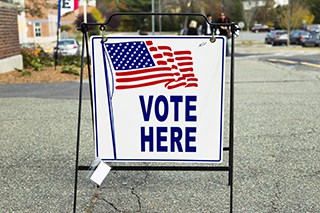


Every week, as I read through the news, attend county and city meetings, and hear comments from residents, I learn more about the complicated pool of local government authority.
This week I’m taking a break from my usual format to focus on four measures that will be on the ballot for voters in the Treasure Valley.
Ada County Highway District. The ACHD wants voters to pass a vehicle registration fee increase, which would make the current maximum fee the new minimum. The current maximum fee is $40, specifically for new vehicles one to two years old. If this measure passes, $42 will be the new minimum fee, specifically for vehicles 7 years or older. Ada County residents pay this fee in addition to the Idaho Transportation Department fee, meaning their total fee for registering their vehicles will be higher than these ACHD fees ($139 for a new vehicle, if the measure passes).
It's been 10 years since the ACHD last asked for an increase, in 2008 when the fee increased from $20 to $40 for a new vehicle. The 2008 election set this fee for 20 years, but if the November 2018 ballot measure passes, it “will be in effect until altered by voters.” In other words, there is no end date for the fee increase; it will remain the same until another vehicle registration fee ballot measure appears. The pattern of past fee changes shows that voters have only been asked to increase fees, never to reduce them. Thus, if the increase is approved, it most likely means a permanent increase.
College of Western Idaho. Voters in Ada County and Canyon County be warned: Passage of a levy for a CWI health science building could cost taxpayers up to $47 million. The ballot measure never mentions the $47 million total, but that is the real cost of the levy, because $4.7 million each year for 10 years adds to $47 million.
This ballot question is proposed as a levy because a levy requires less voter approval than a bond. In 2016, Treasure Valley residents rejected a $180 million bond for CWI. A bond requires a supermajority (66%) of voters to pass, however levies only require the approval of 55% of voters to pass.
This levy is being used to quickly obtain funds in order to keep other, already-appropriated monies from state taxpayers. In total, the health science building is estimated to cost $49 million. Note, this is $2 million more than the proposed $47 million levy. Why is the November levy less than the building’s estimated cost? Because, in early 2018, the Idaho State Legislature passed a $10 million appropriation for a CWI health science building. The appropriation came with a stipulation: By June 2019, CWI needs to secure the entire balance of the construction funds. Instead of taking time to fundraise and use private sources to secure the rest of the cost, CWI wants to again tap taxpayers, who have already been taxed via the state-level appropriation.
If this levy passes, the $47 million plus the state-appropriated $10 million would give CWI a total of $57 million. Subtract the estimated cost of the CWI building—$49 million—and there is an extra $8 million incorporated into the levy.
Kuna Rural Fire District. Passage of this ballot measure would mean a permanent $1.1 million increase in the levy for Kuna property owners. Normally, taxing districts are not allowed to raise their levy rate more than 3% each year. That is why this increase in the levy rate comes in the form of a ballot measure that has to be voted on by residents.
The Kuna Rural Fire District intends to use this levy rate, if passed, to hire more firefighters. The district currently has 12 full-time and 10 to 15 part-time or volunteer firefighters. The last ballot measure from the Kuna Rural Fire District was in 1996, when the district asked voters to approve a bond to build a new fire station. That bond was paid off in 2015. If this new ballot measure is passed, property taxes are estimated to increase by $96 a year per $100,000 of taxable property, beginning in fiscal year 2020.
Middleton School District. The Middleton School District is proposing three different bond measures for voters, while already being $40,572,511 in debt. Any combination of these bonds, or none, could be passed. If all three bonds were passed by voters, the total (including interest) would be $40,124,749—a sum almost equal to the district’s existing debt. When combined with the current debt, passage of all three measures would increase the district’s debt to $80,697,260. The three separate bond measures have twice appeared before voters in the form of a single bond measure and failed; now the school district is trying to pass the failed measure as three separate measures.
If you are not located in the Treasure Valley, what are some interesting measures showing up on your ballot? Please comment below and let us know. Thank you!

